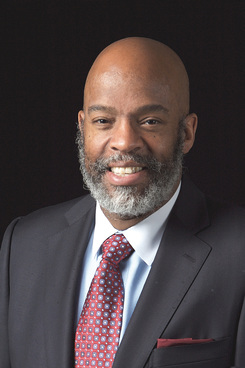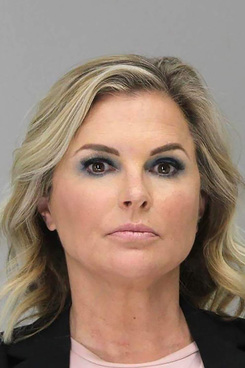Judge Refuses to Step Down From Case of Dallas Salon Owner Shelley Luther, Who Cited His Facebook Post
Dallas salon owner Shelley Luther's recusal motion filed Wednesday alleged that Judge Eric Moyé had a "pre-existing bias towards anyone who protested stay-at-home orders."
May 28, 2020 at 06:57 PM
4 minute read
 Photo: Bigstock
Photo: Bigstock
Judge Eric Moyé of the 14th District Court on Thursday declined to recuse himself in the lawsuit against Dallas salon owner Shelley Luther.
Luther and her company, Salon a la Mode, had asked Moyé to recuse himself Wednesday in the case she's defending against the city of Dallas, which alleged that Luther defied COVID-19 orders to open her business early.
The recusal motion filed Wednesday alleged that Moyé had a "pre-existing bias towards anyone who protested stay-at-home orders."
 Judge Eric Moye of Dallas County's 14th District Court. Courtesy photo.
Judge Eric Moye of Dallas County's 14th District Court. Courtesy photo.Moyé wrote a Facebook post, linking to an article of a woman who organized a protest against stay-home orders, and later tested positive for COVID-19. Moyé's post said, "I am SO in love with that Lady named Karma," the motion said. The post is gone now, the filing added.
Luther claimed that the post showed "a personal bias or prejudice concerning the subject matter when he expressed disgust with the conduct of government lockdown protestors."
After denying the recusal request, Moyé referred Luther's motion to his area's regional presiding judge, Ray Wheless. He can either handle the motion himself, or appoint a judge to hear it.
Wheless has said in the past that he has granted recusal motions based on things that judges posted on Facebook.
Read more: Need a Judge Removed From a Case? 8 Tips—From Judges—on How To Do It
The recusal motion is unlikely to succeed. A large number of judges voluntarily recuse themselves from cases when they think it's warranted, according to a Texas Lawyer article. However, when a judge refuses to step down voluntarily, it's highly unlikely that the recusal motion will win at the next level. In that situation, data shows the motions only succeed 6% of the time, says data from the Texas Office of Court Administration.
Read more: Judges Don't Like Your Recusal Requests—And There's Data to Prove It
In the case, Luther violated a temporary restraining order that Moyé issued, by keeping her salon open. Her violation prompted the judge to find her in contempt of court and sentence her to jail time. However, the Texas Supreme Court ordered her released from jail, as it handles a habeas corpus petition by Luther.
Luther's motion to recuse said that when Luther was arrested and jailed, her story and Moyé's involvement became international news.
Related story: Texas Attorneys Defend Judge Who Sentenced Dallas Salon Owner to Jail
Texas Attorney General Ken Paxton sent a letter to Moyé urging her release from jail. The 12 civil district judges of Dallas County wrote Paxton a collective response that said his letter offended separation of powers, and was an improper ex parte communication.
The motion added that since all 12 of Dallas's district judges signed the response letter to Paxton, they shouldn't hear the case either. She asked for a retired judge, or a judge who did not sign the letter, to be appointed.
 Shelley Luther's arrest mugshot. Photo: Dallas County Sheriff's Office
Shelley Luther's arrest mugshot. Photo: Dallas County Sheriff's OfficeIn other court filings this week, Luther denied all of the city of Dallas' allegations in the lawsuit. She argued that the case should be dismissed under the Texas Citizens Participation Act.
Luther also filed a counterclaim—which adds the state and Gov. Greg Abbott as defendants—that alleges that the Disaster Act of 1975, the law that underlies the Dallas emergency rules, is void because it unconstitutionally delegates legislative power that belongs to the governor, county judges and city mayors. She argued that the emergency rules violate separation of powers, are void for vagueness, violate due process and equal protection, and more.
Executive orders from the governor, Dallas county judge, mayor and Dallas city manager required Dallas salons to close, although businesses like liquor stores, day cares, grocery and home-improvement stores could open. The counterclaim said even though the restrictions now have been relaxed, "this set of conditions is predictably likely to occur yearly, and thus likely to repeat."
Read the full counterclaim:
Related story:
Texas Attorney Swept Up in Political Storm Over His Representation of a Jailed Dallas Salon Owner
This content has been archived. It is available through our partners, LexisNexis® and Bloomberg Law.
To view this content, please continue to their sites.
Not a Lexis Subscriber?
Subscribe Now
Not a Bloomberg Law Subscriber?
Subscribe Now
NOT FOR REPRINT
© 2025 ALM Global, LLC, All Rights Reserved. Request academic re-use from www.copyright.com. All other uses, submit a request to [email protected]. For more information visit Asset & Logo Licensing.
You Might Like
View All

'Close Our Borders?' Senate Judiciary Committee Examines Economics, Legal Predicate for Mass Deportation Proposal
3 minute read
Ex-Prosecutor Builds Niche Practice in Civil Human-Trafficking Suits
5 minute readTrending Stories
- 1'It's Not Going to Be Pretty': PayPal, Capital One Face Novel Class Actions Over 'Poaching' Commissions Owed Influencers
- 211th Circuit Rejects Trump's Emergency Request as DOJ Prepares to Release Special Counsel's Final Report
- 3Supreme Court Takes Up Challenge to ACA Task Force
- 4'Tragedy of Unspeakable Proportions:' Could Edison, DWP, Face Lawsuits Over LA Wildfires?
- 5Meta Pulls Plug on DEI Programs
Who Got The Work
Michael G. Bongiorno, Andrew Scott Dulberg and Elizabeth E. Driscoll from Wilmer Cutler Pickering Hale and Dorr have stepped in to represent Symbotic Inc., an A.I.-enabled technology platform that focuses on increasing supply chain efficiency, and other defendants in a pending shareholder derivative lawsuit. The case, filed Oct. 2 in Massachusetts District Court by the Brown Law Firm on behalf of Stephen Austen, accuses certain officers and directors of misleading investors in regard to Symbotic's potential for margin growth by failing to disclose that the company was not equipped to timely deploy its systems or manage expenses through project delays. The case, assigned to U.S. District Judge Nathaniel M. Gorton, is 1:24-cv-12522, Austen v. Cohen et al.
Who Got The Work
Edmund Polubinski and Marie Killmond of Davis Polk & Wardwell have entered appearances for data platform software development company MongoDB and other defendants in a pending shareholder derivative lawsuit. The action, filed Oct. 7 in New York Southern District Court by the Brown Law Firm, accuses the company's directors and/or officers of falsely expressing confidence in the company’s restructuring of its sales incentive plan and downplaying the severity of decreases in its upfront commitments. The case is 1:24-cv-07594, Roy v. Ittycheria et al.
Who Got The Work
Amy O. Bruchs and Kurt F. Ellison of Michael Best & Friedrich have entered appearances for Epic Systems Corp. in a pending employment discrimination lawsuit. The suit was filed Sept. 7 in Wisconsin Western District Court by Levine Eisberner LLC and Siri & Glimstad on behalf of a project manager who claims that he was wrongfully terminated after applying for a religious exemption to the defendant's COVID-19 vaccine mandate. The case, assigned to U.S. Magistrate Judge Anita Marie Boor, is 3:24-cv-00630, Secker, Nathan v. Epic Systems Corporation.
Who Got The Work
David X. Sullivan, Thomas J. Finn and Gregory A. Hall from McCarter & English have entered appearances for Sunrun Installation Services in a pending civil rights lawsuit. The complaint was filed Sept. 4 in Connecticut District Court by attorney Robert M. Berke on behalf of former employee George Edward Steins, who was arrested and charged with employing an unregistered home improvement salesperson. The complaint alleges that had Sunrun informed the Connecticut Department of Consumer Protection that the plaintiff's employment had ended in 2017 and that he no longer held Sunrun's home improvement contractor license, he would not have been hit with charges, which were dismissed in May 2024. The case, assigned to U.S. District Judge Jeffrey A. Meyer, is 3:24-cv-01423, Steins v. Sunrun, Inc. et al.
Who Got The Work
Greenberg Traurig shareholder Joshua L. Raskin has entered an appearance for boohoo.com UK Ltd. in a pending patent infringement lawsuit. The suit, filed Sept. 3 in Texas Eastern District Court by Rozier Hardt McDonough on behalf of Alto Dynamics, asserts five patents related to an online shopping platform. The case, assigned to U.S. District Judge Rodney Gilstrap, is 2:24-cv-00719, Alto Dynamics, LLC v. boohoo.com UK Limited.
Featured Firms
Law Offices of Gary Martin Hays & Associates, P.C.
(470) 294-1674
Law Offices of Mark E. Salomone
(857) 444-6468
Smith & Hassler
(713) 739-1250







